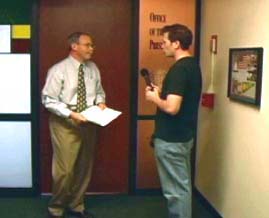It's not a big secret that colleges and universities nationwide tend towards a liberal bias. This inherently may not be a bad thing, but a sense of balance is always good. Look at all the political documentaries arriving in theaters. With the 2004 election, many people are extremely pissed at George W. Bush, so they made documentaries against him and his administration. The flood of anti-conservative movies got old quick. Conservatives belatedly made some in response, but in general, those just weren't that great. How does this sense of balance affect college campuses? According to Brainwashing 101, the imbalance is leading to a number of problems. Evan Coyne Maloney decided to investigate this when he heard about some goings on at Bucknell, his alma mater.
Brainwashing 101 is a smart documentary that shows what can result when political correctness, liberalism, and a sense of pride collide. Maloney approaches things in a very Michael Moore-like way. He takes his camera and begins interviewing people, sometimes just by walking up to them and asking questions. Heck, he even made an appearance in WMD ambush interviewing Moore. Maloney does a lot of what Moore does (except he sure looks a lot better) in terms of mugging for the camera, and making some snide comments, but he is much better because he simply asks if what happens in this three case studies are reasonable. The events he followed seem so bizarre and unreasonable that he has no reason to twist the facts or hide portions that make his arguments seem less powerful. He simply presents the background, interviews the affected people, and tries (sometimes very amusingly) to get the opposing viewpoint.
One criticism about some liberals is that while they champion free speech, they suppress free speech that does not conform to their views. It makes absolutely no sense, and is apparently happening at Bucknell, where professors espouse leftist views, creating a climate of fear for the conservative students on campus. Maloney posits that many colleges go about this in a roundabout way; through their codes of conduct. These codes are vaguely worded and selectively enforced, sometimes leading to unbelievable circumstances, like what he encountered at Cal Poly San Luis Obispo. Steven Hinkle posted a flyer advertising a speaker for his college Republicans meeting. On this flyer was the phrase "It's OK to Leave the Plantation," which was the title of a book by Mason Weaver, a conservative African American who was to be the speaker. Somehow, this earned him a lawsuit from the school, because he was causing a disruption. It's best to leave the details to the film, but needless to say, it is baffling at how something that seems so black and white can escalate as far as it did.
Finally, Maloney ends up at the University of Tennessee at Knoxville, where he looks at a conservative Sikh student and some idiots who went in blackface to a Halloween party. Maloney spends a little too much time on the latter, and one of the interviewed students gets it right when he says that while what they did was certainly stupid, it probably wasn't wrong. More disturbing is the treatment of Sukhmani Singh Khalsa, who published a conservative column. He received death threats via e-mail, but the administration did nothing about it. They did nothing when people drew swastikas on his door, yet published security alerts for lesser happenings. The administration's actions got so bad that the Democratic counterparts of the College Republicans joined in protest. Again, it's just baffling watching how something like common sense disappeared. Maloney is highly effective in conveying his point, and paints a dangerous picture of the nature of free speech in colleges today.
